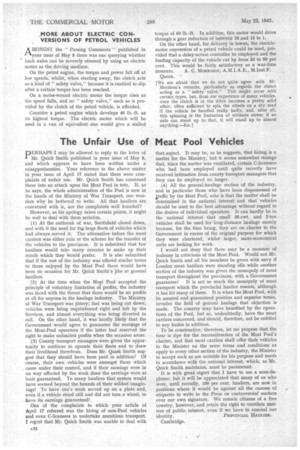The Unfair Use of Meat Pool Vehicles
Page 34

If you've noticed an error in this article please click here to report it so we can fix it.
PERHAPS I may be allowed to reply to the letter of Mr. Quick Smith published in your issue of May 8, and which appears to have been written under a misapprehension. Your reference to the above matter in your issue of April 17 stated that there were complaints of unfair use. Mr. Quick Smith has construed these into an attack upon the Meat Pool in toto. If, as he says, the whole administration of the Pool is now in the hands of the Ministry of War Transport, one wonders why he bothered to write. All that hauliers are concerned with is, are the complaints well founded?
However, as his apology raises certain points, it might be well to deal with them seriatim.
(1) At the outbreak of war, Smithfield closed down, and with it the need for th4. large fleets of vehicles which had always served it. The alternative before the meat carriers was either ruin or the scheme for the transfer of the vehicles to the provinces. It is submitted that few hauliers would take many minutes to make up their minds which they 'would prefer. It is also submitted that if the rest of the industry was offered similar terms to those enjoyed by the Meat Pool there would have been no occasion for Mr. Quick Smith's jibe at general hauliers.
(2) At the time when the Meat Pool accepted the principle of voluntary limitation of profits, the industry was faced with the threat that there would be no profits at all for anyone in the haulage industry. The Ministry of War Transport was jittery; fuel was being cut down; vehicles were being requisitioned right and left by the Services, and 'almost everything was being diverted to rail. On the other hand, it was hardly likely that the Government would agree to guarantee the earnings of the Meat-Pool operators if the latter had reserved the right to make unlimited profits when the occasion arose.
(3) County transport managers were given the opportunity to continue to operate their fleets and to draw their livelihood therefrom. Does Mr. Quiek Smith suggest that they should have been paid in addition? Of course, their own vehicles were amongst those which came under their control, and if their earnings were in no way affected by the work done the earnings were at least guaranteed. To many hauliers that system would have seemed beyond the bounds of their wildest imaginings! To have one's work served up on a plate and, even if a vehicle stood still and did not turn a wheel, to have its earnings guaranteed!
One of the complaints to which your article of April 17 referred was the hiring of non-Pool vehicles and even C-licensees to undertake munitions transport. I regret that. Mr. Quick Smith was unable to deal with that. aspect. It may be, as he suggests, that hiring is a matter for the Ministry, but it seems somewhat strange that, since the matter was ventilated, certain C-licensees who had been employed until quite recently have received intimation from county transport managers that they can be employed no longer.
(4) All the general-haulage section of the industry, and in particular those who have been dispossessed of kaffic by the Meat Pool, asks is that the matter shall be determined in the national interest and that • vehicles should be used to the best advantage without regard to the desires of individual operators. It can hardly be in the national interest that small 30-cwt. and 2-ton vehicles shall be used for long-distance haulage merely because, for the time being, they are on charter to the Government in excess of the original purpose for which they were chartered, whilst larger, more-economical units are looking for work.
I would not deny that there may be a measure of jealousy in criticisms of the Meat Pool. Would not Mr. Quick Smith and all his members be green with envy if London meat hauliers were standing idle while another section of the industry was given the monopoly of meat transport throughout the provinces, with a Government guarantee? It is not so much the monopoly of meat transport which the provincial haulier resents, although it has hit many of them. It is when the Meat Pool, with its assured and guaranteed position and superior terms, invades the field of general haulage that objection is made. The country may have benefited by the operations of the Pool, but so, undoubtedly, have the meat carriers concerned, and should, therefore, not be entitled to any kudos in addition.
To be constructive, therefore, let me propose that the time is •ripe for the reconsideration of the Meat Pool's charter, and that meat carriers shall offer their vehicles to the Minister on the same terms and conditions as apply to every other section of the industry, the Minister to accept such as are suitable for his purpose and needs in accordance with the national interest, which, as Mr. Quick Smith maintains, must be paramount.
It is with great regret that I have to use a nom-deplume; Nit it will be appreciated that many of us who were, until recently, 100 per cent. hauliers, are now in positions where it would be against all the canons of etiquette to write to the Press on controversial matters over our own signature. We remain citizens of a free country, how-ever, And retain the right to ventilate matters of public interest, even if we have to conceal our identity. PROVINCIAL HAULIER. Cambridge.




















































